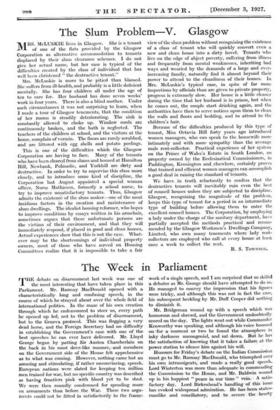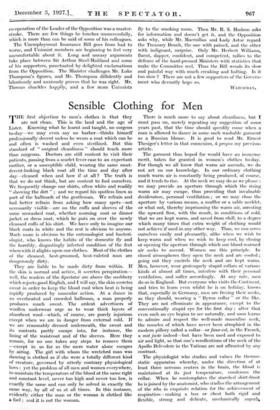The Week in Parliament
THE debate on. disarmament last week was one of the most interesting that have taken place in this Parliament. Mr. Ramsay MacDonald opened with a characteristically long and confusing speech, in the course of which he strayed about over the whole field of international politics.. In the maze of his own creation through which he endeavoured to steer us, every path he opened up led, not to the problem of disarmament, but to the Geneva protocol. .This was flogging a very dead horse, and the Foreign Secretary had no difficulty in establishing the Government's case with one of the best speeches he can ever have delivered.. Mr. Lloyd George began by patting Sir Austen Chamberlain on the back in his . most dove-like mannero- and members: on the Government side of the House felt apprehensive' as to .what was coming. However, nothing came but an amusing and stimulating, if rather unconvincing, speech. European nations were slated for keeping ten million men trained for war, but no specific country was described as having frontiers pink with blood yet to. be shed. We were then roundly condemned for spending more on armaments than before the War. These two argu- ments could not be fitted in satisfactorily to the frame- work of a single speech, and I am surprised that so skilful a debater as Mr. George should have attempted to do so. He managed to convey the impression that his figures were tricky, and although this was not in fact the case, his subsequent heckling by Mr. Duff Cooper did nothing to diminish it.
Mr. Bridgeman wound up with a speech which was humorous and shrewd, and the Government undoubtedly scored on the day. The lights went out while Commander Kenworthy was speaking, and although his voice boomed on for a -moment or two he found the atmosphere in ink] darkness uncongenial, and sat down. Brit he has the satisfaction of knoWing that it takes a failure at the power station to silence him against his will.
Honours for Friday's debate on the Indian Commission must go to Mr. Ramsay MacDonald, who triumphed over his own. intransigents, and made a really 'good -speech. Lord Winterton was more than adequate in commending the Commission to the House, and Mr. Baldwin wound up in his happiest " peace in our 'time " vein. A satis- factory day. Lord. Birkenhead's handling of this issue has evoked widespread admiration. He has been states- manlike and conciliatory; and to secure the -.hearty co-operation of the Leader of the Opposition was a master- stroke. There are few things he touches unsuccessfully, which is More than can be said of some of his colleagues.
The Unemployment Insurance Bill goes from bad to worse, and Unionist members are beginning to feel very uncomfortable about it. Long and uneasy arguments take place between Sir Arthur Steel-Maitland and some of his supporters, punctuated by delighted exclamations from the Opposition. The Minister challenges Mr. Luke Thompson's figures, and Mr. Thompson diffidently and laboriously and anxiously proves that he was right. Mr. Thomas chuckles happily, and a few more Unionists fly to the smoking room. Then Mr. R. S. Hudson asks for information and doesn't get it, and the Opposition asks why, while Mr. Macmillan and Lady Astor regard the Treasury Bench, the one with pained, and the other with indignant, surprise. Only Mr. Herbert Williams, fluent, dapper, confident, and competent, rallies to the defence of the hard-pressed Ministers with statistics that make the Committee reel. Thus the Bill wends its slow and painful way with much creaking and halting. Is it too slow ? There are not a few supporters of the Govern- ment who devoutly hope so.
WATCIIMAN.











































































 Previous page
Previous page